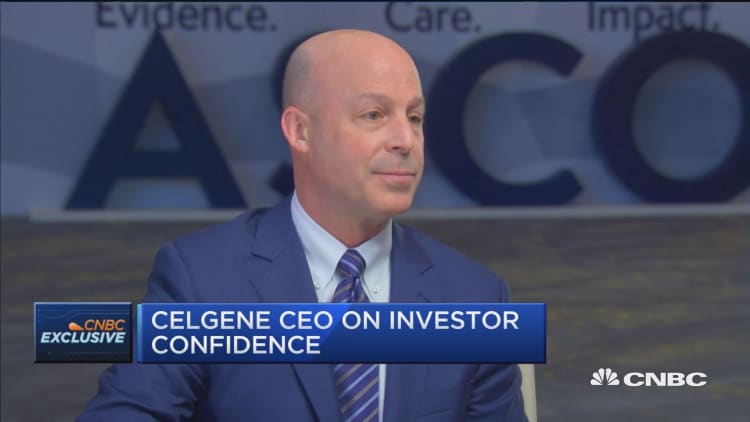
It's not the C-word you may be thinking of.
Dr. Ned Sharpless was not having a Samantha Bee moment; rather, the director of the National Cancer Institute was pontificating on when it makes sense to use that elusive, aspirational word when it comes to cancer treatment: cure.
In a 30-minute interview Sunday at the American Society of Clinical Oncology meeting in Chicago, the Trump-appointed director of the National Institutes of Health's largest unit said he thinks there's good reason to stop being so "sheepish" about uttering "cure" when it comes to cancer.
Below is a transcript of that part of his conversation with CNBC:
Sharpless: "It's a difficult thing in our field; there's been this sort of pendulum. I think early on we had some success in the war on cancer and sort of back in the 1970s this rapid success against pediatric leukemia, and there was this sense that everything was going to be that easy, we're going to cure — I think the War on Cancer Act was 1971 and the prediction was we'd have it done by the nation's bicentennial, 1976 — didn't work out that way (laughs).
So I think there was this group of physicians who came up in an era where we used to tell patients, 'We got it all; we cured you, you're fine,' and then that was manifestly untrue. And I think the pendulum went back to the other side, of, 'Wow, we really — we can cure a few things — leukemia, lymphoma, testis cancer — but we are not really able to cure most advanced solid tumors.' And to use the word 'cure' around a patient with metastatic lung cancer, metastatic colon cancer or metastatic breast cancer was not a good thing to do.
And that's the generation I was trained in. And I think we collectively became very sheepish about using the C-word, or calling it a War on Cancer, or any of those things, and trying to manage expectations and walk people back, and understand that advances in cancer could be very meaningful if they make you live a year longer, even if they don't cure you. So, making people understand that there are intermediates between doing nothing and curing.
But now, I personally feel that maybe we've gone too far to that direction. Where we become so unwilling to talk about it that I think we're confusing our patients, and more importantly to me, as the NCI director, I think we're confusing our funders. Because they're not exactly sure what we're trying to do; if we're not honest about the fact that we're trying to cure cancer, then why should they give us all this money? So I want to be very clear that that's the goal.
And not only is it the goal, it's not a totally unreasonable goal. I am not going to predict the end of cancer any time soon; it's a complicated, heterogeneous problem. But I think it's accurate to say that we are curing people with horrible metastatic solid tumors today that we weren't curing even five years ago. So there's no doubt there's been progress."
Which cancers would he point to? Metastatic melanoma, advanced lung cancer, and cancers with a specific genetic marker known as MSI-high. But Sharpless cautioned that, just because he thinks it's appropriate to use the word "cure" in some settings, there's still a ways to go.
Sharpless: "I do think we have to be clear — if cancer is 10,000 diseases, we need 10,000 cures. So we're not going to have a magic bullet that works on everything tomorrow. We're going to make progress here and not there — and by the way, this is one of the problems with the messaging. Because, while I think it's fair to say we're making tremendous progress, and there's a lot of excitement at this ASCO and every big cancer meeting now, it is not uniform. So we do have some cancers where our progress has been modest."
There, Sharpless named pancreatic cancer, glioblastoma, childhood brain cancer and liver cancer, where he noted mortality is on the rise in the U.S. And he acknowledged that, even in the cancers where he thinks it's appropriate to start using the C-word, treatments still don't work for some patients.
Sharpless: "In those areas where we've made less progress, it's often not for lack of trying. The biology is unpredictable and much harder."
But he said he's optimistic progress will be made in those areas too, citing as one example an NCI-funded program focusing on the most common target found in pancreatic cancer, called the RAS Initiative.
Sharpless: "I think we're seeing a number of clinical trials of agents now in humans that come out of that more nuanced, structural biology-based paradigm. I have no idea if any of these things will work, but I'm hopeful."
And that would be an instance in which anyone would be happy to use the C-word.
WATCH:
Celgene CEO there's nothing like pipeline success to reverse sentiment


